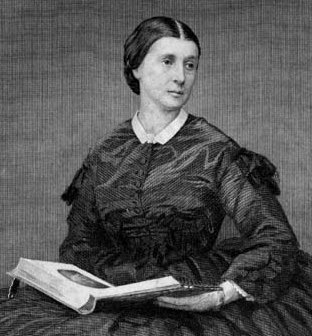Mrs. Greenhow, Confederate Spy
Today, we meet a Confederate spy. The University of Houston's College of Engineering presents this series about the machines that make our civilization run, and the people whose ingenuity created them.
The first important Confederate spy was a young widow named Rose O'Neal Greenhow. Mrs. Greenhow, as everyone called her, was born in the South but raised in Washington, D.C. Writer William Beymer tells her story. She was a bright and influential socialite -- friend to Lincoln and to Buchanan before him. Both presidents dined often at her table.
Then Civil War: Despite Mrs. Greenhow's ties to Washington, her sympathies lay with the South. A Colonel Thomas Jordan dined with her the night before he left to become Adjutant-General of the Confederate Army at Manassas, Virginia, just southwest of Washington. Jordan gave her a code and a phony address. He asked her to send him military intelligence. She was delighted to do so.
So, while the Confederate Army awaited the Union forces, Mrs. Greenhow laid her hands on the Union marching orders. On July 10, 1861, she got word to General Beauregard. She even specified the Union Army's route. Eleven days later, the Confederates had brought up 8500 reinforcements, and the Union suffered its first major defeat around a creek called Bull Run.
However, Mrs. Greenhow was entirely too visible. Her Southern sympathies were no secret, and she had access to key people. The Union planted spies around her and intercepted her messages. They had no trouble breaking the amateur code she was using.
By late August, they had her under house arrest. So she sent up a smokescreen of complaint about the injustice of her treatment, while she bribed guards and servants to get messages out. She gave false or useless information to people trying to gather evidence against her. She gave what solid intelligence she could still glean to those she could trust. But now she was cleverer about packaging it. One trick was to write a message, then wind a ball of yarn around it. Another was to weave it into a woman's hair bun.
After five months, they moved her to the Old Capital Prison. Four more months later, not knowing what to do with her, they extracted a promise that she wouldn't come back and exiled her. When she reached Richmond, Jefferson Davis received her and thanked her for giving the Battle of Bull Run to the South.
Mrs. Greenhow went on to England and France, where she tried to stir up pro-South feeling with a book about her work as a spy. Then, in 1864, the South tried to bring her back to America in a Confederate blockade-runner -- to what purpose, we do not know.
Running in a storm and dodging Yankee ships, the ship's captain ran aground on a sand bar at the mouth of Cape Fear River. Mrs. Greenhow feared she'd be captured and set off toward safety in a lifeboat. The boat swamped, and she drowned, probably weighed down by a money belt. So it wasn't the North that did her in; it was a Southern captain's piloting. Still, she'd been a true casualty of that terrible war. And the South buried her with military honors.
I'm John Lienhard, at the University of Houston, where we're interested in the way inventive minds work.
(Theme music)
Beymer, W. G., Mrs. Greenhow, Confederate Spy. The Women's War in the South: Recollections and Reflections of the American Civil War, (Charles G. Waugh and Martin H. Greenberg, eds.) Nashville: Cumberland House, 1999, Chapter 4.
Greenhow, Mrs., My Imprisonment and the First Year of Abolition Rule at Washington. London: R. Bentley, l863
For more on Rose O'Neal Greenhow, see the Duke University library page which includes some of her letters. http://scriptorium.lib.duke.edu/greenhow/
For a Matthew Brady photo of Rose O'Neal Greenhow and her daughter in the federal prison, see the Matthew Brady Studio website: http://www.npg.si.edu/exh/brady/gallery/51gal.html
I am grateful to Roger Eichhorn, UH Mechanical Engineering Department, for providing both the book and the Web addresses above.

Rose O'Neal Greenhow
(from Greenhow, 1863, above)